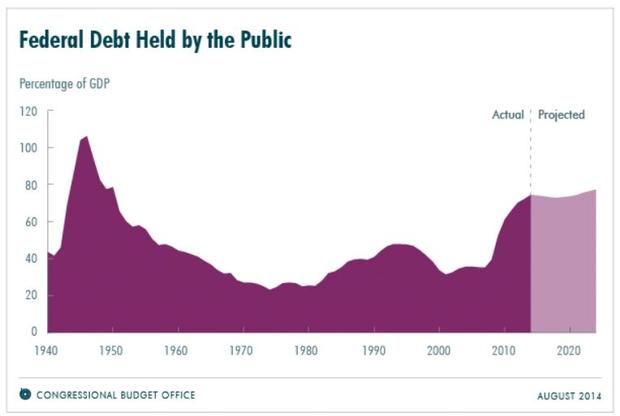What's behind the shrinking federal budget gap
The Congressional Budget Office expects the federal government to run a $506 billion deficit this year, a slight increase from its earlier $492 billion projection but still the lowest level since the start of the financial crisis.
And while government borrowing as a percentage of GDP remains low, the amount of U.S. debt held by the public is at its highest since 1950.
The agency has also lowered its 10-year deficit forecast, from $7.6 trillion it had expected over the next 10 years to $7.2 trillion in new debt. The CBO projects debt held by outside investors to more than double in the next decade from $12.8 trillion by the current fiscal year-end to $26.6 trillion by 2024.
This year's deficit will equal 2.9 percent of gross domestic product, close to the 3.1 percent average of the past 40 years. In total, the deficits will reach $7.2 trillion over the next decade. However, total government debt as a percentage of GDP will hit 74.4 percent this year, the highest since 1950. This is expected to dip slightly but then start rising again in 2018, hitting 77.2 percent in 2024.
"Such high and rising debt would have serious negative consequences for both the economy and the federal budget," the CBO report said. "When interest rates rise to more typical levels -- as CBO expects to happen in the next few years -- federal spending on interest payments will increase considerably. Moreover, when the federal government borrows, it increases the overall demand for funds, which generally raises the cost of borrowing and reduces lending to businesses and other entities; the eventual result would be a smaller stock of capital and lower output and income."
The deficit improvement is primarily due to a change in how the CBO calculates interest payments on the debt. It now assumes that while interest rates will rise above current unusually low levels, they'll still remain somewhat lower than their historical averages.
Even these improvements could disappear if Congress decides to extend the large number of expired and expiring tax provisions. The CBO said if this happens, it will add nearly $900 billion to deficits by 2024. Additionally, easing the automatic budget cuts known as the sequester could add another $900 billion by decade's end.

